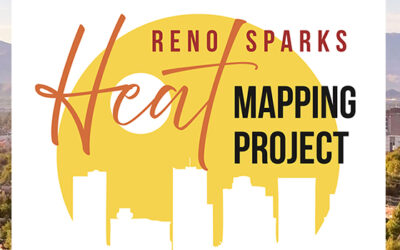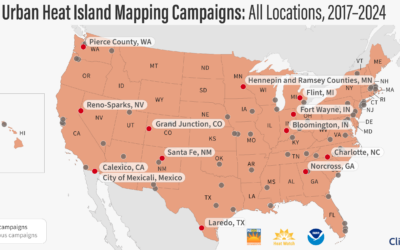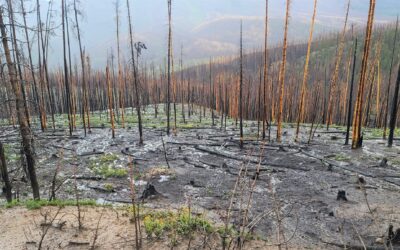Join DRI for an evening of storytelling that explores the impact of extreme heat on the human body, the environment, and the communities most vulnerable to its effects. ‘Under the Sun’ will delve into the science of heat, the life-and-death risks it presents, and the...
Reno-Sparks Heat Mapping Project Releases Detailed Urban Heat Data
The summer 2024 data collection effort provides community members, legislators, and scientists with detailed maps of the region’s urban heat island. The campaign took place on August 10th, a clear and hot day for our region. The measurements and maps produced from the campaign reveal a great deal of variability across the nearly 200 square miles of our study area and between the early morning, mid-afternoon, and early evening time periods of the study.
Meet David Almanza
David Almanza, Ph.D., joined DRI this summer as a postdoctoral researcher in urban climate adaptation. He is working with Ariel Choinard in the Southern Nevada Heat Resilience Lab to examine how heat is impacting communities in and around Las Vegas. Born in Bogota, Colombia, Almanza grew up in Las Vegas and completed his Ph.D. at the University of Nevada, Las Vegas, in 2023. In this interview, Almanza discusses his social science training, what it means to center research on your own community, and his love for Las Vegas eateries.
Reno-Sparks Heat Mapping Project seeking volunteers for August 10
In an effort to better understand urban heat islands and their impacts on our region, a group of organizations, led by the Nevada State Climate Office, is seeking volunteers to track heat on August 10 for the Reno-Sparks Heat Mapping Project. Volunteers will set out in pairs to drive or navigate a predetermined route, equipped with a GPS-equipped temperature and humidity sensor that can be affixed to a volunteer’s car. The original project date was postponed due to unusually cool weather.
Reno Sparks Heat Mapping Project – Call for Volunteers!
Did you know that Reno is the fastest-warming city in the United States? The data collected from this campaign can help allocate resources like tree planting, shade structure installation, and cooling centers. Volunteer to help us with this one-day heat mapping...
Reno-Sparks Heat Mapping Project Now Recruiting Volunteers
Scientists from the Desert Research Institute (DRI) and the University of Nevada, Reno are recruiting volunteers to conduct a one-day campaign to map extreme heat across Washoe County on July 27. community volunteers will fan out across the county to collect thousands of temperature and humidity measurements from early morning through evening, taken over 3 one-hour periods.
Reno/Sparks selected to be part of Urban Heat Mapping Campaign
Several municipal, county, and Tribal governments and community groups based in the Reno-Sparks area are teaming up to map the hottest parts of Reno, Sparks, and adjacent portions of Washoe County.
Meet Ariel Choinard, Project Coordinator for CNAP & Southern Nevada Heat Resiliency Lab
Ariel Choinard, M.A., started at DRI in February 2023 as the project coordinator for the California-Nevada Adaptation Program (CNAP) and the new Southern Nevada Heat Resiliency Lab. She is working with Tamara Wall, Ph.D., to build connections between scientists, community members, and community organizations to co-produce solutions, adaptations, and resilience to natural hazards.
Looking for Answers in a Warming World
DRI researchers are examining the potential for climate intervention techniques to help cool communities – and the planet
For Outdoor Workers, Extreme Heat Poses Extreme Danger
In a new study in the International Journal of Environmental Science and Technology, scientists explore the growing threat that extreme heat poses to workforce health in three of the hottest cities in North America – Las Vegas, Los Angeles, and Phoenix.







